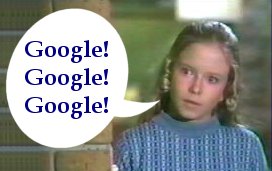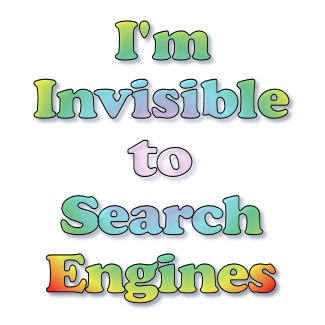Google and Other Search Engine Tips and Tricks |
||||||
|
|
||||||
 >> Click to see current Google stock price <<
>> Click to see current Google stock price <<Google is a BUSINESS and their stock sells for HUNDREDS of dollars a share! They won't list you just because your site is live. Many folks think Google and the other search engines are run like phone books. You sign up for service and it's taken for granted that you'll be listed in the phone book unless you pay extra for an unlisted number. Unfortunately, search engines do NOT work like that. Simply loading a web site doesn't ensure that you'll be listed at ALL...let alone be listed under the search terms you want and at the high ranking you prefer. Think of a search engine more like the bouncer at a popular club. There are only two ways they're going to let you in: either you have to get their attention in a way they understand OR you have to slip them some money to move to the front of the line. Paying for ranking is an entirely different concept, which we don't address here. So, how do you get the bouncer's attention without giving him money? The trendy phrase is "SEO", which stands for "Search Engine Optimization", which simply means making your site optimized (aka "As best as it can be") for search engines. Here are just a few ways to do that: Make sure each page of your site has a full Title Tag.The Title Tag is what Google looks for FIRST, and you can see these easily by adding a page to your Favorites or Bookmarks. The Title Tags on a site are the PRIME real estate for Google. Ensure that you have TONS of text on your site.Google is now giving more weight to the text that's on a site that humans can read. Invest in a larger site.Google uses their "PageRank" system that interprets a link from one page to another as a "vote". So, the more pages, the more links, the more "votes". (If you don't believe us, click here to read Google's own explanation.) Play to your target audience - Part 1.Let's say that you have a rental property near a major attraction. Use the words on your site that your intended customers will use in searches:
U.S. Version: "Vacation rental house with spacious living room in soothing colors."
Play to your target audience - Part 2.Let's say that you sell metals or some type of metal work. If you sell Stainless Steel, you want to use BOTH "Stainless Steel" and "SS" on your site as different purchasing agents will search for different terms. If you offer Silver products, include both "Silver" and "AG" on your site as some will search for the word and some for the chemical symbol. Play to your target audience - Part 3.Use words that would be familiar to the general public. If you sell college funds, then use the words "College Funds" ...don't say that you sell "Programs for the higher education of your progeny". Eliminate graphic buttons.If your site has fancy graphic buttons for the navigation, consider replacing them with text buttons. Graphics are invisible to Google and to search engines. Eliminate graphic text.Since the human viewer can only view text in fonts that THEY have on their computer, many folks are using graphics to show words in cool fonts and looks. Remember, graphics are invisible to search engines so use them for verbiage that's NOT critical to your keywords or to being found.
Consider your domain name carefully.Google looks at the name of your domain for keywords, and each keyword hit counts. So, if you want to be found under "day care", you're better off with "www.SmithDayCare.com" then with "www.SmithBabySitting.com". If you already have a domain name and it doesn't include key words, consider getting one that DOES, putting your web site at this new location and forwarding the old domain name. Register your domain name for several years in advance.Google looks at the total time that a domain name is registered. If you registered your domain name in 2005 and it expires in 2015, that counts as 10 years. If you register the site in 2014, you need to register it through 2024 to get those same 10 years. Remove "Intro" pages.Google looks for index.htm, index.html, index.shtml or pretty much anything with the name "index". The "Index" is the global standard name for a home page. If your index.html (or index.htm) is just a picture or Flash that says "Click here to enter", remove it to allow Google (and human viewers!) to get right into your site. Don't forget interior pages.Ensure that there are meta-tags on EVERY PAGE of your site. The web isn't linear, and both Google and humans can enter your site on any page. Ensure that the meta-tags include the "Robots" command with "index, follow" after it.This tells search engines that no matter what page they land on, they need to go to the "index" page (your home page, see above), and then FOLLOW all the links. |
||||||
